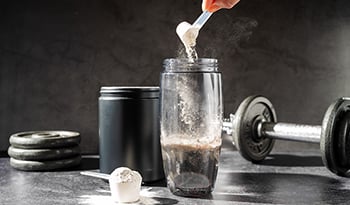Can BCAA (Branched-Chain Amino Acids) Supplements Help With Muscle Soreness?

If you are a frequent gym-goer or athlete, you may have heard the term branched-chain amino acids (BCAAs). They have become one of the most popular sports supplements in recent years. BCAAs are essential to the body and provide many benefits—including reduced muscle soreness following exercise. Let’s look at BCAAs, how they may benefit you, and how to choose an effective BCAA supplement.
What Are BCAAs?
Amino acids are molecules that combine to form proteins in the body. When you eat, your body digests the protein in your food and breaks it down into amino acids. Your body then uses these amino acids to build new proteins, such as skeletal muscle. There are three main types of amino acids:
- Essential amino acids: Your body cannot produce essential amino acids on its own, so you must consume them through the foods you eat. The nine essential amino acids include histidine, isoleucine, leucine, lysine, methionine, phenylalanine, threonine, tryptophan, and valine.
- Nonessential amino acids: These amino acids are normally produced in your body, so you don’t need to consume them in your diet. They include alanine, arginine, asparagine, aspartic acid, cysteine, glutamic acid, glutamine, glycine, proline, serine, and tyrosine.
- Conditional amino acids: Conditional amino acids aren’t mentioned as frequently because they are typically only necessary in times of illness or stress, like when recovering from a burn.
Three essential amino acids—valine, leucine, and isoleucine—are called branched-chain amino acids (BCAAs) because they contain a branched side chain. They differ from the other six essential amino acids in that mitochondria can make them in skeletal muscle to provide energy during exercise.
The BCAAs comprise about 14 to 18% of the amino acids in human skeletal muscle proteins and play an important role in skeletal muscle metabolism. Leucine, in particular, is a key regulator that helps develop muscle mass. Your body needs leucine to produce more skeletal muscle following resistance training.
You can get BCAAs through the foods you eat or through supplements. BCAAs make up about 25% of the amino acids in foods that are complete protein sources. Complete protein sources contain all nine essential amino acids. Foods high in BCAAs include:
- Meat
- Poultry
- Fish
- Eggs
- High-protein dairy products like Greek yogurt
- Whey protein
Whey protein is an excellent source of BCAAs because it has a high concentration of leucine, which aids muscle protein synthesis.
You can also get BCAAs through supplements in both pill and powder form. BCAA supplements contain an average of 4.65 calories per gram, so they will contribute to calorie intake, unlike other supplements that contain zero calories. Some supplements contain the three BCAAs along with additional essential amino acids.
What Are the Benefits of BCAA Supplementation?
Claims that BCAA can enhance muscular adaptations to exercise have led to a rise in BCAA supplement use. Most of the research on BCAAs has been conducted in older adults. As we age, our bodies experience age-related anabolic resistance, and we need higher doses of leucine to maximize muscle protein synthesis for muscle development.
Some evidence suggests taking BCAAs can minimize muscle loss when you are in a caloric deficit and not consuming enough protein. BCAA supplements may also be helpful for vegetarians, vegans, and others who may struggle to consume enough protein.
Studies also suggest that supplementing with BCAA may aid workout recovery by helping reduce muscle damage and soreness after resistance training.
BCAA supplementation may offer cognitive benefits like delaying fatigue and enhancing mental focus by competing with the amino acid tryptophan for entry into the brain. Tryptophan is a precursor to serotonin, a neurotransmitter affecting mood and sleep. BCAAs temporarily delay the effects of tryptophan.
What Causes Muscle Soreness After Workouts?
The muscle soreness you feel after a tough workout is called delayed onset muscle soreness (DOMS). When you engage in repeated eccentric muscle contractions (movements that lengthen the muscle), try a new exercise, or up the intensity of your current workout, your muscles usually get sore. This soreness, which usually shows up one or two days after the exercise, is due to small muscle tears that lead to inflammation.
DOMS can temporarily decrease muscle strength and range of motion while also causing pain and discomfort. This is where branched-chain amino acid supplementation comes in.
Can BCAAs Help Reduce Muscle Soreness?
Studies suggest BCAA supplements can reduce muscle soreness when taken either before or after exercise. A 2021 review of studies found that taking BCAA supplements after exercise reduces muscle soreness in the 24 hours following exercise and lowers post-exercise creatine kinase (CK) production. Creatine kinase is a marker of inflammation—so lower levels mean less exercise-induced muscle damage and less DOMS.
Most studies showing a reduction in DOMS from BCAA supplements used a supplement with a ratio of 2:1:1—two parts leucine, one part isoleucine, and one part valine. Doses varied between 0.20 to 1.76 grams per kilogram of body weight and between 12 to 260 grams.
Another review of studies found that BCAA supplementation in doses of up to 255 mg per kilogram per day may help reduce DOMS symptoms in trained individuals. However, untrained individuals may need a higher dosage to achieve the same effects.
In another study, 2 grams of taurine paired with at least 3.2 grams of BCAAs taken three times daily for 18 days before exercise significantly reduced DOMS.
What to Look for in a BCAA Supplement
When choosing a BCAA supplement, look for a supplement with a high enough dosage of amino acids. Based on study recommendations of 255 mg per kilogram of body weight per day, you might need about 17 grams of BCAAs to help reduce DOMS. Check the dietary supplement label to ensure the supplement dosage is adequate. Studies have shown that dosages of up to 20 grams daily are safe. For leucine alone, dosages of 500 mg per kilogram of body weight have also been deemed safe.
Also, make sure the supplement you choose contains the proper ratio of BCAAs. A ratio of 2:1:1 of leucine to isoleucine to valine is most effective. Many supplements advertise this ratio.
As with all supplements, choose a BCAA supplement that has been third-party certified. Many supplements list ingredients as a “proprietary blend” without listing specific amounts of certain ingredients. Labeling practices like this make it challenging to know whether a supplement contains the proper dosage of key ergogenic ingredients.
Third-party certifications ensure that an independent organization has examined the manufacturing process and determined that the supplement meets specific standards for quality and safety. When looking to see if a supplement has been third-party certified, look for the “NSF” label on the back of the supplements. According to its website, NSF, the National Sanitation Foundation, is the only independent and third-party testing organization offering true dietary supplement testing.
References:
- Amino Acids. https://medlineplus.gov/ency/article/002222.htm
- Plotkin DL, Delcastillo K, Van Every DW, Tipton KD, Aragon AA, Schoenfeld BJ. Isolated Leucine and Branched-Chain Amino Acid Supplementation for Enhancing Muscular Strength and Hypertrophy: A Narrative Review. International Journal of Sport Nutrition and Exercise Metabolism. 2021;31(3):292-301. doi:10.1123/ijsnem.2020-0356
- Dietary Supplements for Exercise and Athletic Performance. https://ods.od.nih.gov/factsheets/ExerciseAndAthleticPerformance-HealthProfessional/#bcaa
- Witard OC, Bannock L, Tipton KD. Making Sense of Muscle Protein Synthesis: A Focus on Muscle Growth During Resistance Training. International Journal of Sport Nutrition and Exercise Metabolism. 2022;32(1):49-61. doi:10.1123/ijsnem.2021-0139
- Khemtong C, Kuo CH, Chen CY, Jaime SJ, Condello G. Does Branched-Chain Amino Acids (BCAAs) Supplementation Attenuate Muscle Damage Markers and Soreness after Resistance Exercise in Trained Males? A Meta-Analysis of Randomized Controlled Trials. Nutrients. 2021 May 31;13(6):1880. doi: 10.3390/nu13061880. PMID: 34072718; PMCID: PMC8230327.
- Kim J, Lee J. A review of nutritional intervention on delayed onset muscle soreness. Part I. J Exerc Rehabil. 2014;10(6):349-356. Published 2014 Dec 31. doi:10.12965/jer.140179
- Tanabe Y, Fujii N, Suzuki K. Dietary Supplementation for Attenuating Exercise-Induced Muscle Damage and Delayed-Onset Muscle Soreness in Humans. Nutrients. 2021;14(1):70. Published 2021 Dec 24. doi:10.3390/nu14010070
- Weber MG, Dias SS, de Angelis TR, Fernandes EV, Bernardes AG, Milanez VF, Jussiani EI, de Paula Ramos S. The use of BCAA to decrease delayed-onset muscle soreness after a single bout of exercise: a systematic review and meta-analysis. Amino Acids. 2021 Nov;53(11):1663-1678. doi: 10.1007/s00726-021-03089-2. Epub 2021 Oct 20. PMID: 34669012.
- Ra SG, Miyazaki T, Ishikura K, Nagayama H, Komine S, Nakata Y, Maeda S, Matsuzaki Y, Ohmori H. Combined effect of branched-chain amino acids and taurine supplementation on delayed onset muscle soreness and muscle damage in high-intensity eccentric exercise. J Int Soc Sports Nutr. 2013;10:51
- What is a Third-Party Certification? https://www.nsf.org/knowledge-library/what-is-third-party-certification
- Proprietary blends: What does this mean? https://www.opss.org/article/proprietary-blends-what-does-mean
- Supplement and Vitamin Certification. https://www.nsf.org/consumer-resources/articles/supplement-vitamin-certification
DISCLAIMER:This Wellness Hub does not intend to provide diagnosis...















































































 Table of Contents
Table of Contents
















